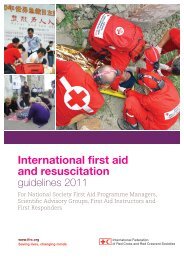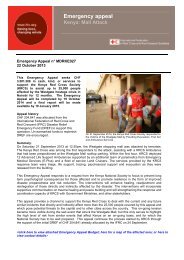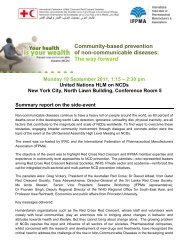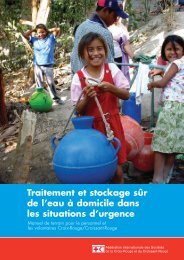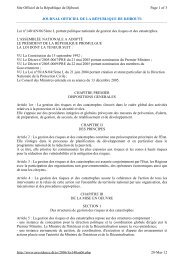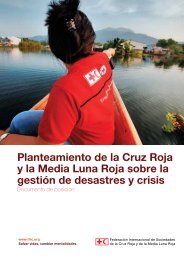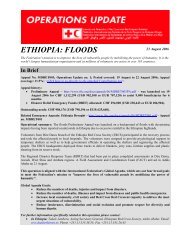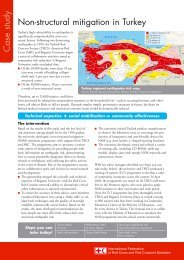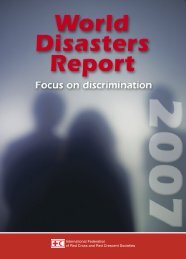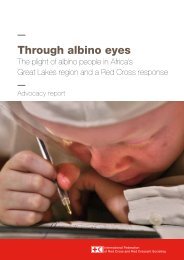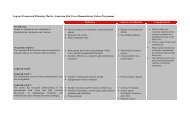World Disasters Report 2010 - International Federation of Red Cross ...
World Disasters Report 2010 - International Federation of Red Cross ...
World Disasters Report 2010 - International Federation of Red Cross ...
You also want an ePaper? Increase the reach of your titles
YUMPU automatically turns print PDFs into web optimized ePapers that Google loves.
124<br />
Several initiatives – including the C40 Climate Leadership Group and Cities for<br />
Climate Protection, sponsored by ICLEI-Local Governments for Sustainability – help<br />
share knowledge and good practices between cities involved in reducing their greenhouse<br />
gas emissions. Urban authorities in low- and middle-income nations have also<br />
begun to exploit opportunities to generate ‘carbon credits’ through reducing emissions<br />
from solid waste management and other activities. At the same time, however, it must<br />
be ensured that these efforts do not divert attention from the strong adaptation needs<br />
that face many residents <strong>of</strong> these cities.<br />
Box 6.3 Urban flooding in Ireland<br />
Much <strong>of</strong> urban Ireland was thrown into chaos<br />
by widespread flooding in the same week in<br />
November 2009 that the Irish Academy <strong>of</strong> Engineering<br />
(IAE) published a landmark report<br />
Ireland At Risk – Critical Infrastructure and Climate<br />
Change which warned that storm surges<br />
combined with a sea-level rise <strong>of</strong> 50cm would<br />
mean that a one-in-100-year flood could happen<br />
as <strong>of</strong>ten as every five years.<br />
Rainfall totals were the highest on record<br />
for November in many places and river levels<br />
reached record heights as the Irish <strong>Red</strong> <strong>Cross</strong><br />
deployed volunteers and ambulances to assist<br />
in evacuations and to ensure that vital health<br />
personnel were able to report to work.<br />
Months later the island nation, whose major<br />
cities all lie on the coast, was still counting the<br />
cost. In County Cork alone, it was estimated that<br />
flood damage ran to 100 million euros as a dam<br />
equipped with a new 50-metre-wide spillway designed<br />
to cope with an extreme flood, failed to<br />
cope. The River Lee burst its banks and flooded<br />
the centre <strong>of</strong> Cork, Ireland’s second largest city.<br />
“Failure to act now will put our society at<br />
an unacceptable risk,” said the IAE’s president,<br />
Michael Hayden. “You’ve only to think<br />
<strong>of</strong> Hurricane Katrina for an example <strong>of</strong> how<br />
climate change coupled with poor planning<br />
and zoning decisions can lead to social and<br />
economic disaster.”<br />
In a week when the country’s major rivers<br />
burst their banks, the academy warned that<br />
homes in coastal cities could become uninsurable<br />
unless urgent measures were taken and<br />
cited Benjamin Franklin’s adage: “An ounce <strong>of</strong><br />
prevention is worth a pound <strong>of</strong> cure.”<br />
The IAE further predicted that unless urgent<br />
action was taken to strengthen critical infrastructure<br />
the following would happen: changing<br />
rainfall patterns would affect water supplies;<br />
rising sea levels would inundate coastal<br />
cities and towns; severe weather incidents<br />
would damage energy installations, hospitals,<br />
telecommunications, railways and other critical<br />
infrastructure, and contaminate water supplies.<br />
The Irish Sunday Tribune newspaper noted<br />
in an editorial other factors that played a role<br />
in the November flooding which saw thousands<br />
<strong>of</strong> people evacuated from their homes:<br />
“The legacy <strong>of</strong> the past decade has been one<br />
<strong>of</strong> appalling and corrupt planning decisions<br />
which have allowed building on flood plains;<br />
building regulations that allowed uninsulated,<br />
energy-inefficient homes to be thrown up anyhow,<br />
anywhere; inadequate flood management<br />
schemes which at times have been poorly<br />
managed; and now last week, the failure to<br />
have a fully working flood emergency plan in<br />
operation should the worst happen has added<br />
to the misery <strong>of</strong> tens <strong>of</strong> thousands <strong>of</strong> people.”



